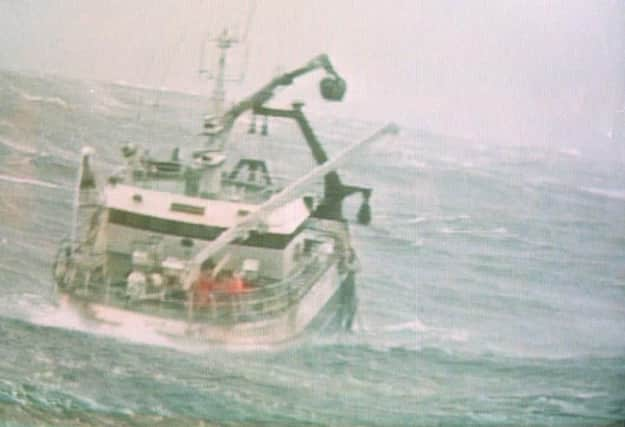Change call after cooling systems sink ships


Dramatic pictures of the final moments of the Buckie-registered Audacious as she foundered off the Aberdeenshire coast have been included in a detailed report on the loss of the two vessels published by the Marine Accident Investigation Branch.
The twin rigged stern trawler sank 45 miles east of Aberdeen on 10 August last year - 22 days before the Brixham-based beam trawler “Chloe T” foundered 17 miles south west of Bolt Head in Devon.
Advertisement
Hide AdAdvertisement
Hide AdBoth vessels - successfully abandoned by their crews without loss of life - sank after their engine rooms flooded rapidly and the bilge pumps were unable to cope with the ingress of water. It is believed that both accidents were caused by the failure of the vessels’ seawater cooling systems.
In a special introduction to the joint report on the two sinkings, Steve Clinch, the head of the MAIB, has highlighted the need for “significant” improvements in the vessel safety oversight and scrutiny provided by the MCA.
Mr Clinch states: “The responsibility for ensuring that the structural integrity and safe operation of fishing vessels, together with the safety of their crews, rests firmly with vessel owners. However, the Maritime and Coastguard Agency’s inspection and survey regime is intended to provide an appropriate level of oversight and scrutiny to ensure that vessel owners are discharging their safety responsibilities.
“Both investigations reach the conclusion that the instructions provided to MCA surveyors with respect to important issues such as the testing and inspection of seawater pipe work systems needs to be improved.
“Of more concern is that both investigations also identified that the record keeping and management systems used by MCA surveyors require significant improvement. Missing intermediate inspections and delays in the renewal survey process were noted in both cases. It is unlikely that either vessel received the level of oversight that was intended by the MCA’s instructions to its surveyors.”
He continues: “It is disappointing to note that similar observations were made by the MAIB following the loss of the fishing vessel Harvest Hope in August 2005. At that time the MCA undertook to conduct an internal inquiry into the identified shortfalls but, nonetheless these weaknesses appear to remain more than seven years later.
“ Accordingly, recommendations have been made to the MCA which seek to improve the scope, scheduling, application and record keeping for surveys and inspections of fishing vessels.”
The MAIB inspectors have also recommended that the the Scottish Fishermen’s Federation, and the English-based the National Federation of Fishermen’s Organisations should “promulgate” the lessons learned from the two sinkings, particularly the need for fishing vessel operators to thoroughly inspect seawater pipework.
Advertisement
Hide AdAdvertisement
Hide AdThe MCA is urged to conduct a review of its surveys and inspections regime to ensure records are accurate and complete and to implement a “robust system” to manage the scheduling of surveys and inspections on fishing vessels. Such a system, states the MAIB, should be capable of readily identifying vessels that are overdue for any surveys or inspections.
The report into the Audacious states: “The MAIB investigation of the accident found that the flooding was probably due to the failure of the sea inlet pipework in the engine room, and that the wheelhouse had been unmanned for periods prior to the accident.
“It was also found that statutory surveys and inspections had not been undertaken in accordance with the terms and conditions of the vessel’s UK fishing vessel certificate (UKFVC).
“Audacious was surveyed by the MCA in August 2008, and a UKFVC was issued in December 2008. As no intermediate inspection was carried out on Audacious, it must be concluded that the UKFVC was not valid after 31 December 2011.
“The MCA’s instructions state clearly that vessels operating without valid UKFVCs are liable to immediate detention. However, there was no record of a detention, and it is likely that Audacious continued to operate during this period without a valid UKFVC.”
The report adds: “Poor management and communication between Audacious’s owner and the MCA led to the vessel not being inspected as required and the UKFVC being ‘rendered invalid’. While this was contrary to the regulations, of far greater practical significance was that the vessel’s material condition fell outside the system of scrutiny provided by the MCA.”